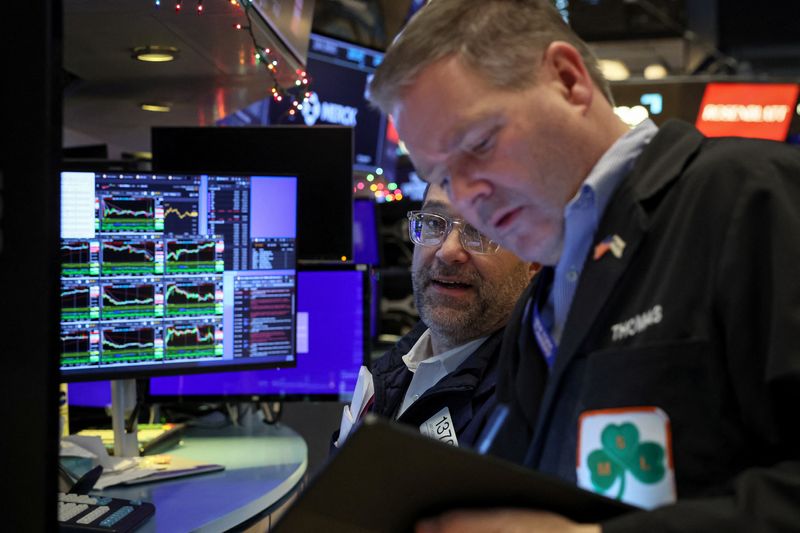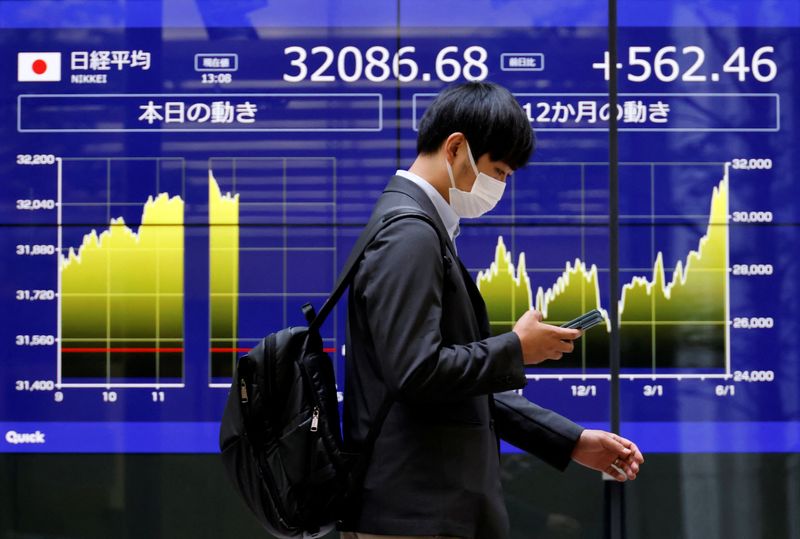By Stephen Culp
NEW YORK (Reuters) -U.S. stocks pared earlier gains to close modestly higher on Thursday, while benchmark Treasury yields dropped to multi-month lows after investors rotated out of momentum growth stocks following the U.S. Federal Reserve's dovish pivot.
The dollar hit a two-week low against the euro and more than a four-month low against the yen.
The three major U.S. stock indexes gyrated, reclaiming positive territory by mid-afternoon the day after the Fed's much-anticipated policy decision to leave interest rates unchanged while saying that historic rate cuts are likely over.
"We had the pleasant dovish surprise from the Fed yesterday, and after a huge start to the month of December we’re seeing a little consolidation," said Ryan Detrick, chief market strategist at Carson Group in Omaha, Nebraska. "But under the surface we're seeing extreme strength from small caps and mid caps while large caps catch their breath, potentially a sign this bull market is broadening out with more stocks participating."
On Wednesday, the Fed indicated its tightening phase was at an end and signaled that rate cuts are in the cards for 2024, sending the Dow to an all-time closing high.
All three major U.S. indexes remain on course for their seventh straight weekly gains.
In a busy day for central banks, the European Central Bank (ECB) also held interest rates steady but pushed back against the notion of rate cuts. The Bank of England echoed the ECB, insisting interest rates would be elevated "for an extended time.
Elsewhere, the Swiss National Bank held rates firm but lowered inflation forecasts, while Norway's central bank surprised with a rate hike.
On the economic front, U.S. retail sales unexpectedly rebounded in November and jobless claims dipped, further evidence of consumer resilience, which has market participants increasingly betting on a soft landing for the U.S. economy.
"The soft landing that many doubted was possible is becoming more realistic every day," Detrick said. "Inflation is no longer the problem it was and we still have a very healthy consumer, judging by today’s retail sales data."
The Dow Jones Industrial Average rose 158.11 points, or 0.43%, to 37,248.35, the S&P 500 gained 12.46 points, or 0.26%, to 4,719.55, and the Nasdaq Composite added 27.60 points, or 0.19%, to 14,761.56.
European shares gave back some gains, but still closed at a more than 22-month high as the dovish Fed offset the ECB's dismissal of rate cut speculation.
The pan-European STOXX 600 index rose 0.87% and MSCI's gauge of stocks across the globe gained 1.00%.
Emerging market stocks rose 2.01%. MSCI's broadest index of Asia-Pacific shares outside Japan closed 1.98% higher, while Japan's Nikkei lost 0.73%.
Treasury yields slid to multi-month lows as bond investors braced for rate cuts in 2024.
Benchmark 10-year note yields dropped to 3.9152% from 4.033% late on Wednesday.
The 30-year bond yield eased to 4.0364% from 4.184% late on Wednesday.
The greenback tumbled against a basket of world currencies, while the euro gained ground after the ECB held rates steady but pushed back against imminent rate cuts.
The dollar index fell 0.9%, with the euro up 1.05% to $1.0987.
The Japanese yen strengthened 0.73% versus the greenback at 141.86 per dollar, while Sterling was last trading at $1.2765, up 1.17% on the day.
Oil prices surged in opposition to the soft dollar after the International Energy Agency (IEA) lifted its oil demand forecast for next year.
U.S. crude rose 3.04% to settle at $71.58 per barrel, while Brent settled at $76.61 per barrel, surging 3.16% on the day.

Gold prices advanced in opposition to the weakening dollar, touching a 10-day high.
Spot gold added 0.4% to $2,035.41 an ounce.
